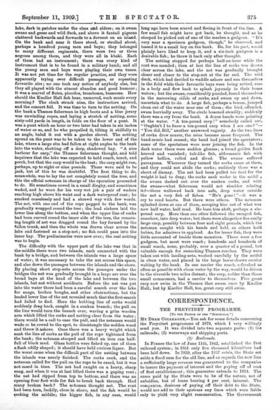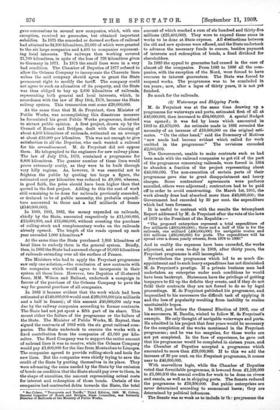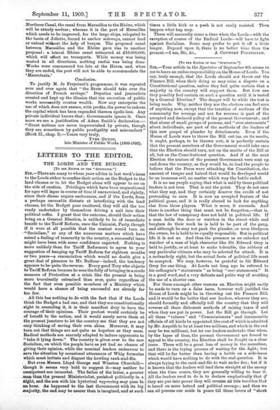CORRESPONDENCE.
THE FREYCINET PROGRAMME.
[TO THE EDITOR OF THE " SPEGTATOE.1
My DEIS, COLLEAGUE,—You ask for some details concerning the Freycinet programme of 1879, which I very willingly send you. It was divided into two separate parts (1) the railroads; (2) waterways and shipping ports.
(1) Railroads.
In France the law of June 11th, 1842, established the first railroad system; in 1851 only five thousand kilometres had been laid down. In 1859, after the 1857 crisis, the State set aside a fixed sum for the old line, and as regards the new line a sufficiently large revenue was guaranteed to the companies to insure the payment of interest and the paying off of cost of first establishment ; this guarantee extends to 1914. The sums paid by the State were to be of the nature, not of subsidies, but of loans bearing 4 per cent. interest. The companies, desirous of paying off their debt to the State, would not add to their systems any lines which were liable only to yield very slight remuneration. The Government
gave concessions to several new companies, which, with one exception, received no guarantee, but obtained important subsidies. In 1875 the conceded or decreed surface of railroad had attained to 34,300 kilometres, 23,000 of which were granted to the six large companies and 4,400 to companies represent- ing local interests. The railways then working covered 21,700 kilometres, in spite of the loss of 738 kilometres given to Germany in 1871. In 1875 the small lines were in a very bad condition. The Chamber of Deputies of 1877 refused to allow the Orleans Company to incorporate the Charente lines unless the said company should agree to grant the State permanent right to modify the tariff. The company could not agree to such an alienation of its property, and the State was thus obliged to buy up 2,600 kilometres of railroads, representing both general and local interests, which, in accordance with the law of May 18th, T878, became the State railway system. This transaction cost some £20,000,000.
At the same time that M. de Freycinet, then Minister of Public Works, was accomplishing this disastrous measure he formulated his great Public Works programme, destined to attract public opinion. A first project, drawn up by the Council of Roads and Bridges, dealt with the classing of about 4,500 kilometres of railroads, estimated on an average at about £10,000 per kilometre. This was not enough to give satisfaction to all the Deputies, who each wanted a railroad for his arrondissement. M. de Freycinet did not oppose them. He telegraphed to the engineers for new railway plans. The law of July 17th, 1879, contained a programme for 8,800 kilometres. The greater number of these lines would prove extremely costly, as they were to be built through very hilly regions. As, however, it was essential not to frighten the public by quoting too large a figure, the estimated cost per kilometre was reduced to £8,000, whereas, in good faith, the price should have been higher than that quoted in the first project. Adding to this the cost of work still remaining to be done for railroads previously conceded, or declared to be of public necessity, the probable expendi- ture amounted to three and a half milliards of francs (2140,000,000).
In 1880, 1881, 1882, the money expended on railroads, chiefly by the State, amounted respectively to £11,000,000, £13,000,000, and £15,000,000, without counting the purchase of rolling-stock and complementary works on the railroads already opened. The length of the roads opened up each year exceeded 1,000 kilometres.* At the same time the State purchased 1,800 kilometres of local lines to embody them in the general system. Briefly, then, in 1882 the State had assumed charge of 16,000 kilometres of railroads extending over all the surface of France.
The Ministers who had to apply the Freycinet programme saw only one solution,—the conclusion of new contracts with the companies which would agree to incorporate in their system all those lines. However, two Deputies of ill-starred fame, MM. Wilson and Baihaut, undertook a campaign in favour of the purchase of the Orleans Company to pave the way for general purchase of all companies.
In 1883 it became evident that the work which had been estimated at £140,000,000 would cost 2260,000,000 (six milliards and a half in francs); of this amount £40,000,000 only was due by the railway companies according to former contracts. The State had not yet spent a fifth part of its share. This meant either the failure of the programme or the failure of the State. The Minister of Public Works, M. Raynal, then signed the contracts of 1883 with the six great railroad com- panies. The State undertook to execute the works with a fixed contribution from the companies of £1,000 per kilo- metre. The Nord Company was to support the entire amount of railroad lines it was to receive, while the Orleans Company would pay £1,600,000 for the line from Montauban to Limoges. The companies agreed to provide rolling-stock and tools for new lines. But the companies were chiefly trying to save the credit of the State by putting themselves in its place. They were advancing the sums needed by the State by the emission of bonds on condition that the State should pay over to them, in the shape of annuities, the amount representing actual costs for interest and redemption of those bonds. Certain of the companies had contracted debts towards the State, the total
See Colson, "Transports and Tariffs," Third Edition, 1908. M. Colson, Generalspec r of Reads and Bridges, State Councillor, waa formerly Director ofoads at the Ministry of Public Works.
amount of which reached a sum of six 'hundred and thirty-five millions (e25,400,000). They were to expend these sums in works to be done at State expense. All distinctions between the old and new systems were effaced, and the State undertook to advance the necessary funds to ensure, besides payment of interests and redemption of bonds, a fixed dividend for shareholders.
In 1883 the appeal to guarantee bad ceased in the case of almost all the companies. From 1883 to 1886 all the com- panies, with the exception of the Nord, were forced to have recourse to interest guarantees. The State was forced to suspend works. The programme was to be concluded in ten years ; now, after a lapse of thirty years, it is not yet finished.
So much for the railroads.
(2) Waterways and shipping Ports.
M. de Freycinet was at the same time drawing up a programme for waterways and ports, estimated first of all at £48,000,000, then increased to £64,000,000. A special Budget was opened ; it was fed by loans which amounted lit
1883 to £5,870,000. An estimate made in 1881 revealed the necessity of an increase of £10,000,000 on the original esti- mates. " On the other hand," said the Summary of Motives " new needs had become evident which called for work omitted in the programme." The revisions exceeded £2,000,000.
The Government, unable to make contracts such as had been made with the railroad companies to get rid of the part of the programme concerning railroads, were forced in 1884 to abandon a fraction of the project representing about £40,000,000. The non-execution of certain parts of their programme gave rise to great disappointment and heavy charges. Some contractors' agreements were perforce annulled, others were adjourned ; contractors had to be paid off in order to avoid constructing. On March 1st, 1901, the work already done had absorbed more than £43,000,000; the Government had exceeded by 30 per cent. the expenditure which had been foreseen.
It is useful to contrast with the results the triumphant Report addressed by M. de Freycinet after the vote of the laws of 1879 to the President of the Republic, :—
"The proposed enterprises represent a total expenditure of five milliards (.2200,000,000) ; three and a half of this is for the railroads, one milliard (X/10,000,0000) for navigable routes and 500 millions (X20,000,000) for ports. The expenditure will be spread over a dozen yearly returns, from 1878 to 1890."
And in reality the expenses have been exceeded, the works adjourned, and even to-day in 1909, after thirty years, the Freycinet programme is still incomplete.
Nevertheless the programme which led to so much dis- appointment and to such heavy expenditure has not diminished M. de Freycinet's prestige. If a private business man had undertaken an enterprise under such conditions he would have been bankrupt. Statesmen have the privilege of getting taxpayers to fill up the deficits they create, and if they do not fulfil their contracts they are not forced to do so by legal proceedings. M. de Freycinet published his programme, and bequeathed to his successors the difficult task of applying it and the loss of popularity resulting from inability to realise unattainable hopes.
In 1901, just before the General Election of 1902, one of his successors, M. Baudin, wished to follow M. de Freycinet's example. He only thought of navigable waterways and ports. He admitted in his project that four years would be necessary for the completion of the works mentioned in the Freycinet programme ; and he was too sanguine, for those works are
not yet completed. In the face of experience, he gave out that his programme would be completed in sixteen years, and the Chamber of Deputies accepted a programme which amounted to more than £28,000,000. If to this we add the increase of 30 per cent, on the Freyoinet programme, it comes near to £40,000,000.
With marvellous logic, while the Chamber of Deputies voted that formidable programme, it lowered from £1,128,000 to 21,080,030 the annual credits for work to be done on rivers and canals, as well as in shipping ports. The Senate reduced the programme to £10,300,000. But public enterprises are never determined according to economical bases ; they are determined by political influences.
The Senate was so weak as to include in th programme the
- Northern Canal, the canal from Marseilles to the Rhone, which will be utterly useless ; whereas it is the port of Marseilles which needs to be improved, for the large ships, relegated to the basin of Joliette, forced to anchor sideways, cannot load or unload without the help of barges. The proposed canal between Marseilles and the Rhone gave rise to another proposal : a lateral Rhone canal estimated at £16,000,000, which will effect no transports. While money was being wasted in all directions, nothing useful was being done. - Works were commenced too late at the Havre, and, when they are ended, the port will not be able to accommodate the `Mauretania.'
Conclusion.
To justify M. de Freycinet's programme, it was repeated over and over again that " the State should take over the direction of French savings." Deputies and journalists created and kept up the illusion that the execution of public works necessarily creates wealth. Now any enterprise the use of which does not ensure, with profits, the power to redeem the capital which has been expended thereon spells loss. Any private individual knows that ; Governments ignore it. Once more we see a justification of Adam Smith's declaration :— ." Great nations are never impoverished by private, though they are sometimes by public prodigality and misconduct " (Book II., chap. 3).—Yours very truly, YVES GITY0T, late Minister of Public Works (1889-1892).








































 Previous page
Previous page